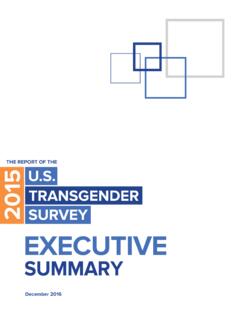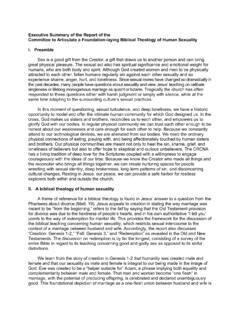Transcription of Kenya Youth Survey Report-Executive Summary
1 1 The Kenya Youth Survey Report1 January 18, 2016 Alex O. Awiti & Bruce Scott Tell me what are the prevailing sentiments that occupy the minds of your young men, and I will tell you what is to be the character of the next generation . Edmund Burke (1729 97) executive Summary Kenya is a very youthful country. The median age is estimated at 19 years, and about 80 percent of Kenya s population is below 35 years. To a very large extent, Kenya s Youth defined as individuals between the ages of 18 and 35 will determine the shape of the country s future.
2 With that in mind, the East African Institute of the Aga Khan University commissioned a Survey to understand the values, attitudes, concerns and aspirations of this critical segment of the population. We interviewed 1,854 respondents ages 18-35 from across the country, including both urban and rural areas. The Survey reveals a number of important and sometimes surprising insights, and offers reasons both for optimism, deep concern and the need for urgent action. The Youth identify as Kenyans first, faith and tribe.
3 They value family, faith and hard work. They give evidence of being entrepreneurial: the majority would like to start their own business, rather than pursue careers in law, teaching, medicine or engineering. Few (11%) want to become farmers, suggesting that the country s urbanization is likely to continue apace, intensifying demand and competition for off-farm employment. Moreover, Kenyan Youth are largely positive and optimistic about the future and are confident that it will be more prosperous, offering more jobs and better access to health and education.
4 1 For further information please contact Dr. Alex O. Awiti; 2 The study also reveals that Youth are suffering from and concerned about unemployment. And it shows that many hold beliefs that make them vulnerable to political manipulation and that risk undermining democracy and good governance. Indeed, it is not too much to speak of a crisis of integrity among Kenya s Youth . While the findings may seem contradictory hopeful and depressing there is an opportunity to focus on developing and channeling the strongly held positive values of faith, family, hard work and a strong Kenyan identity to address the anomalies in honesty and integrity, while mobilizing public and private sector resources to tackle the most urgent concerns, especially unemployment.
5 Key Findings 1. Identity: It is widely believed that Kenya is irredeemably fractured country. However, ethnicity is the least important dimension of identity among Kenyan Youth . 40% of Youth identify as Kenyans first, while 35% identify as Youth first. About 12% identify by their faith first, while less than 5% of Kenyan Youth identify by their ethnicity first, although the number is higher among those between 30 and 35. The sense of regional identity is extremely limited: less than one percent identify as East African.
6 2. Integrity: 50% believe it doesn t matter how one makes money as long as one does not end up in jail; 47% admire those who make money through hook or crook, (including hustling); 30% believe corruption is profitable; 73% are afraid to stand up for what is right for fear of retribution; only 40% strongly believe that it is important to pay taxes. 35% of the Youth would readily take or give a bribe. 3. Political Participation: Overall, the Youth have positive views about politics and democracy. 90% believe it is important to vote, while 70% believe they have the power to make a difference.
7 However, 62% of the Youth are vulnerable to electoral bribery, with 40% saying they would only vote for a candidate who bribed them. Compared to the urban counterparts, rural males were twice as likely to vote for the candidate who bribed them; similarly, 40% more rural women, compared to urban women, would vote for the candidate who bribed them. 4. Values: When asked what they value most, 85% valued faith first, 60% valued family first, 45% valued work first and 30% valued both wealth and freedom first.
8 However, while work is a respected value, the association between hard work and success declines dramatically with level of education; 83% of Youth with only a primary education believe that they will succeed if they work hard, compared to 50% of Youth with post-graduate education. 5. Aspirations: A majority of Kenyan Youth (48%) would like to go into business. 26% percent wish to pursue careers such as engineering, law, medicine, and teaching, and only 11% would wish to go into farming. 6. Education Dividend: 78% had attained post-primary education, 39% of the Youth had post-secondary education.
9 Only 22% had primary education as the highest level of education. This is by far, Kenya s best-educated generation. 3 7. Employment: Overall, unemployment among Youth was 55%. Unemployment was highest among women (62%), and even higher among rural women (68%). Employment rates were lowest among those without post-secondary education (15%). By comparison, 32% of those with post-secondary education were unemployed. 1 in 2 graduates were unemployed and only 1 in 5 Youth with university degrees were in self-employment.
10 Youth aged between 18 and 25 were twice more likely to be unemployed compared to their counterpart aged 26 to 35 years. 8. Youth and Government: What they think about government; 40% trust politicians, while 65% trust government. The most trusted institution is the family (94%) followed by religious organizations at 86%. Only 52% of the Youth had knowledge of government initiatives for Youth ; 76% of the Youth reported that they have not benefited from government-initiated Youth programs. What the Youth want government to address: Unemployment was by far, the top concern at 63%.









